The following video shows real footage from the event and commentary:
The VVAW: A Force to be Reckoned with
By 1971, the perception of the Vietnam War was starting to become an extremely divisive topic in the eyes of the American people. News of the horrors of war, the continued stalemate, and increasing civilian casualties were causing people to question a war they originally thought was for all the right reasons. Many vocal groups began to form in opposition to the war and massive demonstrations were common across the country.In April 1971, thousands of Vietnam Veterans from a newly formed organization called Vietnam Veterans Against the War (VVAW) met in Washington, D.C. calling for an end to the war in Vietnam. The event was called Operation Dewey Canyon III by the veterans, named after a series of small scale incursions into Laos and Cambodia by the same name. The veterans called it a “limited incursion into the country of Congress.” The week of demonstrations started at Arlington Cemetery and spread to other iconic venues in the nation’s capital throughout the week. Despite repeated attempts by parts of the federal government to thwart the veterans’ protest efforts, the veterans remained strong and united in defying government authority in order to enforce their message.
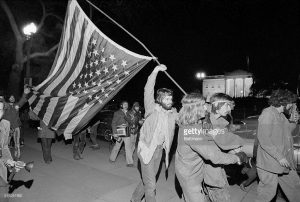
In April 1971, thousands of Vietnam Veterans from a newly formed organization called Vietnam Veterans Against the War (VVAW) met in Washington, D.C. calling for an end to the war in Vietnam. The event was called Operation Dewey Canyon III by the veterans, named after a series of small scale incursions into Laos and Cambodia by the same name. The veterans called it a “limited incursion into the country of Congress.” The week of demonstrations started at Arlington Cemetery and spread to other iconic venues in the nation’s capital throughout the week. Despite repeated attempts by parts of the federal government to thwart the veterans’ protest efforts, the veterans remained strong and united in defying government authority in order to enforce their message.
Many different protest strategies were used including but not limited to: singing, guerrilla theater, occupation of monuments and offices, aggressive lobbying with officials, and camping on federal grounds. The most symbolic of these strategies occurred on the last day when Veterans went to the U.S. Capitol to hand over their awards and medals to Congress. That morning, almost 1,000 veterans arrived at the Capitol building to find a freshly-built fence preventing anyone from getting too close to the building. The fence didn’t stop the veterans.
After putting a sign on the statue in front of the Capitol building that read “TRASH,” one by one each veteran stood before the crowd of protestors and other onlookers and said their name, rank, regiment and the award they received from Vietnam. Then they would turn around and throw awards, medals, ribbons, commendations and many other materials from the war over the fence at the foot of the statue.
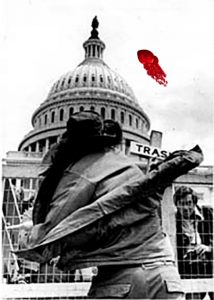
Opposition at Home
People said that the veterans against the Vietnam War were traitors, that they were disrespectful to their fallen comrades and their regiment, and that they were communist sympathizers.
The idea that they were traitors is not valid because they had served their country and were merely exercising their right as citizens to criticize the government.
There is a certain amount of disrespect that is evident in the protest, but that isn’t necessarily bad. The government had lost the respect of the veterans because they refused to listen to them and continued to put resources towards an unjust war. In other words, the government didn’t deserve respect. Though their actions of throwing away awards for comrades could be seen as disrespectful, it was really a sign of sacrifice and symbolism of how they were martyrs for the wrong cause.
The true problem here wasn’t communism. The veterans weren’t promoting communism at all. In fact, the very action of criticizing the government is a very democratic principle that really is only able to happen because of democracy. The veterans loved their country, but not their government.
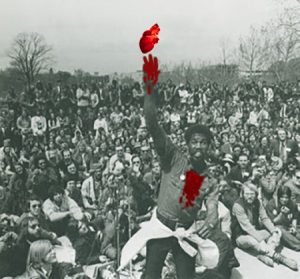
A True Act of Courage and Patriotism
This symbolic act by the veterans is one of the strongest acts of protest in American history. It is an act of defiance, sacrifice, and true patriotism.
By throwing away their awards, the Vietnam Veterans were actively defying the government. They were calling them out for deceiving the American people, for continuing to enforce a war that could not be won, and for trying to cover up the atrocities that were committed by the military. Some men even said on the steps how they didn’t want to fight anymore, but if they had to, it would be to take the steps of the capitol. This strong statement was basically calling for revolution if necessary.
Imagine giving up the only token you had to show for fighting in a war with no meaning and no just cause. The only thing you had to show for your sacrifice and the sacrifice of your comrades was an award, ribbon, or medal. Knowing the power of its message, you willingly throw these away, labeling them as garbage. This is the sacrifice that this particular protest strategy symbolized – they were stripping themselves of any symbols that were trying to justify their actions in Vietnam, but also of their own honor.
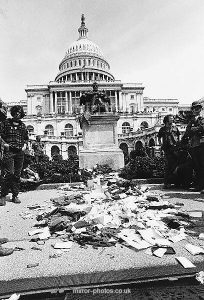
The statue outside of the US Capitol building where all the awards and medals were thrown by the veterans.
“Dissent is the highest form of patriotism” – This is a quote that is often attributed to Thomas Jefferson, one of the nation’s founding fathers and authors of our most treasured documents. A patriot is someone who vigorously supports their country and is prepared to defend it from enemies. These Veterans loved their country, but not their government. They saw the government as the enemy of the United States because of its efforts to fight a war with no chance of true victory at the expense of young lives. Throwing away these medals issued by their government showed that they rejected their government and demanded change, adding also a threat of escalation if need be. Dissent itself is a sacrifice, and true patriots will sacrifice everything for the love of their country.
By fighting in a war that meant nothing, these veterans had sacrificed more than those in the past who had fought for just causes – causes against true evil and injustice. This time they had answered the call to fight for what ended up being the invading side and the side that was killing innocent people. They sacrificed their morals, their innocence, and, most importantly, their hearts.
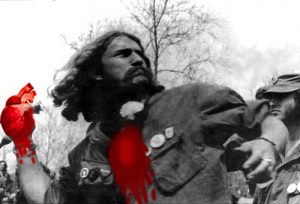
Links and References
Videos
VVAW Dewey Canyon III – https://www.youtube.com/watch?v=4P1zXcQ3ZGw
A Vietnam War veteran speaking at an anti-war protest in Washington – https://www.youtube.com/watch?v=wkJ2aIRQl-I
Vets throwing medals at Washington – https://www.youtube.com/watch?v=j7jhs-bGyFQ
Forrest Gump: Best Scene – https://www.youtube.com/watch?v=NcOTZeZ3_40
Dewey Canyon III – https://www.youtube.com/watch?v=Emg-a_qTFQ0
Music
“Fortunate Son,” Creedence Clearwater Revival, 1969
“Main Titles from the HBO Miniseries Band of Brothers,” Michael Kamen, 2001
“Band of Brothers Requiem (Voice),” Michael Kamen, 2001
Images
https://www.pinterest.com/pin/345510602634888996/
http://www.vvaw.org/veteran/article/?id=1882
http://www.vvaw.org/veteran/article/?id=112
http://www.viewsandthoughts.com/wp-content/uploads/kerry-throwing-medals-1.jpg
Other References
Operation Dewey Canyon III – http://www.vvaw.org/veteran/article/?id=1656
Vietnam Veterans Against the War (Wikipedia) – https://en.wikipedia.org/wiki/Vietnam_Veterans_Against_the_War

